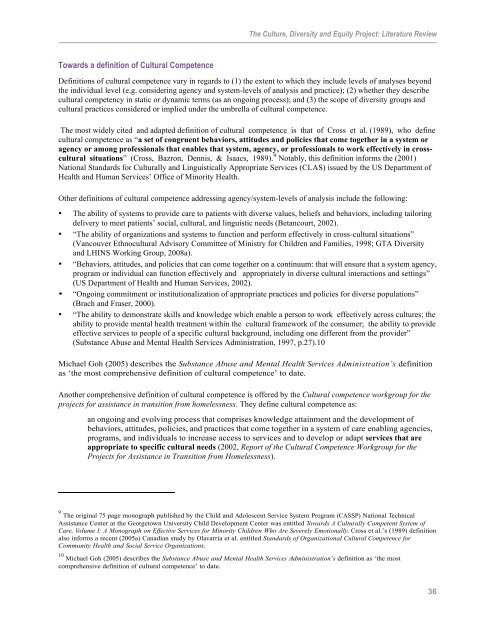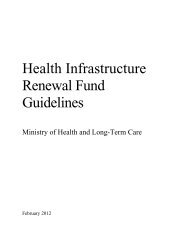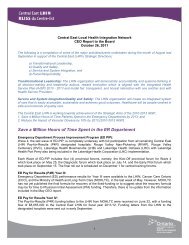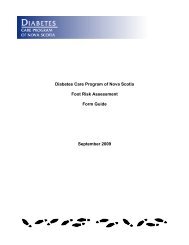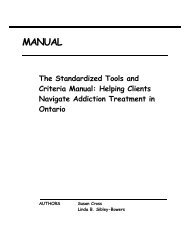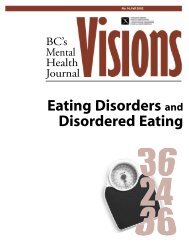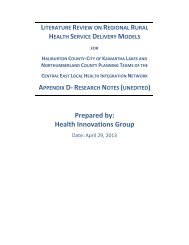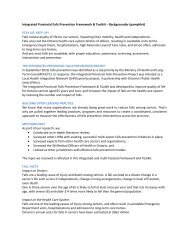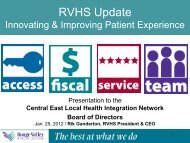CDE Appendix 1 Literature Review - Central East Local Health ...
CDE Appendix 1 Literature Review - Central East Local Health ...
CDE Appendix 1 Literature Review - Central East Local Health ...
You also want an ePaper? Increase the reach of your titles
YUMPU automatically turns print PDFs into web optimized ePapers that Google loves.
The Culture, Diversity and Equity Project: <strong>Literature</strong> <strong>Review</strong><br />
Towards a definition of Cultural Competence<br />
Definitions of cultural competence vary in regards to (1) the extent to which they include levels of analyses beyond<br />
the individual level (e.g. considering agency and system-levels of analysis and practice); (2) whether they describe<br />
cultural competency in static or dynamic terms (as an ongoing process); and (3) the scope of diversity groups and<br />
cultural practices considered or implied under the umbrella of cultural competence.<br />
The most widely cited and adapted definition of cultural competence is that of Cross et al. (1989), who define<br />
cultural competence as “a set of congruent behaviors, attitudes and policies that come together in a system or<br />
agency or among professionals that enables that system, agency, or professionals to work effectively in crosscultural<br />
situations” (Cross, Bazron, Dennis, & Isaacs, 1989). 9 Notably, this definition informs the (2001)<br />
National Standards for Culturally and Linguistically Appropriate Services (CLAS) issued by the US Department of<br />
<strong>Health</strong> and Human Services’ Office of Minority <strong>Health</strong>.<br />
Other definitions of cultural competence addressing agency/system-levels of analysis include the following:<br />
• The ability of systems to provide care to patients with diverse values, beliefs and behaviors, including tailoring<br />
delivery to meet patients’ social, cultural, and linguistic needs (Betancourt, 2002).<br />
• “The ability of organizations and systems to function and perform effectively in cross-cultural situations”<br />
(Vancouver Ethnocultural Advisory Committee of Ministry for Children and Families, 1998; GTA Diversity<br />
and LHINS Working Group, 2008a).<br />
• “Behaviors, attitudes, and policies that can come together on a continuum: that will ensure that a system agency,<br />
program or individual can function effectively and appropriately in diverse cultural interactions and settings”<br />
(US Department of <strong>Health</strong> and Human Services, 2002).<br />
• “Ongoing commitment or institutionalization of appropriate practices and policies for diverse populations”<br />
(Brach and Fraser, 2000).<br />
• “The ability to demonstrate skills and knowledge which enable a person to work effectively across cultures; the<br />
ability to provide mental health treatment within the cultural framework of the consumer; the ability to provide<br />
effective services to people of a specific cultural background, including one different from the provider”<br />
(Substance Abuse and Mental <strong>Health</strong> Services Administration, 1997, p.27).10<br />
Michael Goh (2005) describes the Substance Abuse and Mental <strong>Health</strong> Services Administration’s definition<br />
as ‘the most comprehensive definition of cultural competence’ to date.<br />
Another comprehensive definition of cultural competence is offered by the Cultural competence workgroup for the<br />
projects for assistance in transition from homelessness. They define cultural competence as:<br />
an ongoing and evolving process that comprises knowledge attainment and the development of<br />
behaviors, attitudes, policies, and practices that come together in a system of care enabling agencies,<br />
programs, and individuals to increase access to services and to develop or adapt services that are<br />
appropriate to specific cultural needs (2002, Report of the Cultural Competence Workgroup for the<br />
Projects for Assistance in Transition from Homelessness).<br />
9 The original 75 page monograph published by the Child and Adolescent Service System Program (CASSP) National Technical<br />
Assistance Center at the Georgetown University Child Development Center was entitled Towards A Culturally Competent System of<br />
Care, Volume I: A Monograph on Effective Services for Minority Children Who Are Severely Emotionally. Cross et al.’s (1989) definition<br />
also informs a recent (2005a) Canadian study by Olavarria et al. entitled Standards of Organizational Cultural Competence for<br />
Community <strong>Health</strong> and Social Service Organizations.<br />
10 Michael Goh (2005) describes the Substance Abuse and Mental <strong>Health</strong> Services Administration’s definition as ‘the most<br />
comprehensive definition of cultural competence’ to date.<br />
36


